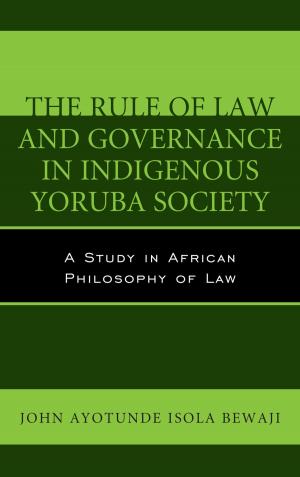Paul Ricoeur and the Task of Political Philosophy
Nonfiction, Religion & Spirituality, Philosophy, Existentialism, Political| Author: | ISBN: | 9780739167748 | |
| Publisher: | Lexington Books | Publication: | October 26, 2012 |
| Imprint: | Lexington Books | Language: | English |
| Author: | |
| ISBN: | 9780739167748 |
| Publisher: | Lexington Books |
| Publication: | October 26, 2012 |
| Imprint: | Lexington Books |
| Language: | English |
This book discusses the political philosophy of Paul Ricoeur. More precisely, it offers a sustained engagement with Ricoeur’s political thought in a way that demonstrates both the significance of the political in his own thinking throughout his career, and how Ricoeur’s understanding of the political offers something valuable to current discussions in political philosophy. A second goal is to begin to fill a gap in Ricoeur studies and situate his work on political ethics more fully in contemporary discussions about political thought. In this way, Ricoeur can be seen as a figure pertinent to recent trends in political philosophy that make political thinking more realistic to the conditions for political life. The various essays in the book move along intersecting but different trajectories. First, as some of these essays attest, the concept of the political is a pervasive theme that runs throughout Ricoeur’s corpus. In this way a theme throughout the book examines this notion of the political, as well as how it relates to his more well-known work in other areas. Second, and related, the historical understanding of perennial issues in political philosophy are most often updated by those standing in the lineage of those who have come before. As such, Ricoeur’s hermeneutical orientation has moved him to engage contemporaries who attempt to “think forward” in various ways this tradition for current situations. Unlike most who engage in political thought, Ricoeur goes where others dare not, namely, to those who appear to be opponents but, as he shows, offer perspectives worth more consideration in the name of the best of political thinking. In this light, Ricoeur’s hermeneutical orientation is again a unique framework for understanding the nature of political engagement, an orientation in what follows that highlights the ways that Ricoeur and a Ricoeurian perspective cross philosophical orientations to develop a unique understanding of political thought that is different.
This book discusses the political philosophy of Paul Ricoeur. More precisely, it offers a sustained engagement with Ricoeur’s political thought in a way that demonstrates both the significance of the political in his own thinking throughout his career, and how Ricoeur’s understanding of the political offers something valuable to current discussions in political philosophy. A second goal is to begin to fill a gap in Ricoeur studies and situate his work on political ethics more fully in contemporary discussions about political thought. In this way, Ricoeur can be seen as a figure pertinent to recent trends in political philosophy that make political thinking more realistic to the conditions for political life. The various essays in the book move along intersecting but different trajectories. First, as some of these essays attest, the concept of the political is a pervasive theme that runs throughout Ricoeur’s corpus. In this way a theme throughout the book examines this notion of the political, as well as how it relates to his more well-known work in other areas. Second, and related, the historical understanding of perennial issues in political philosophy are most often updated by those standing in the lineage of those who have come before. As such, Ricoeur’s hermeneutical orientation has moved him to engage contemporaries who attempt to “think forward” in various ways this tradition for current situations. Unlike most who engage in political thought, Ricoeur goes where others dare not, namely, to those who appear to be opponents but, as he shows, offer perspectives worth more consideration in the name of the best of political thinking. In this light, Ricoeur’s hermeneutical orientation is again a unique framework for understanding the nature of political engagement, an orientation in what follows that highlights the ways that Ricoeur and a Ricoeurian perspective cross philosophical orientations to develop a unique understanding of political thought that is different.















